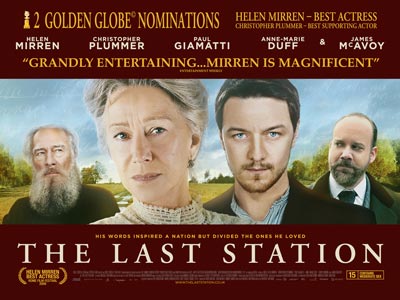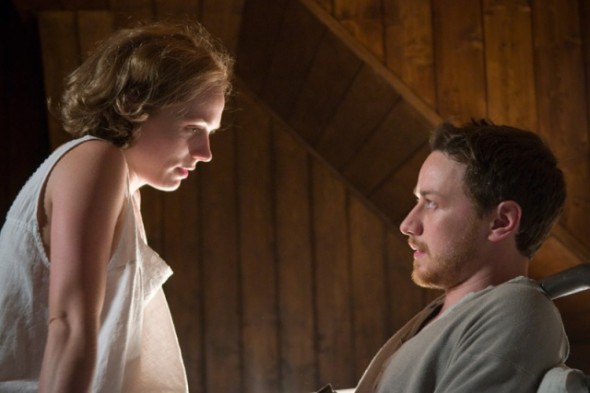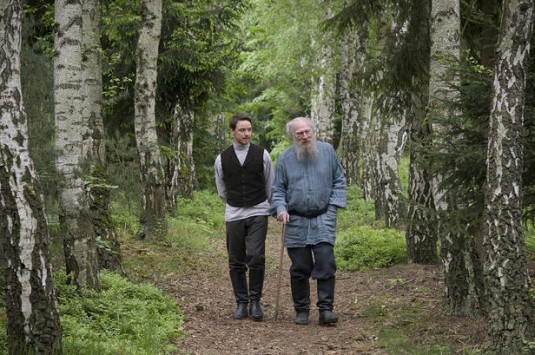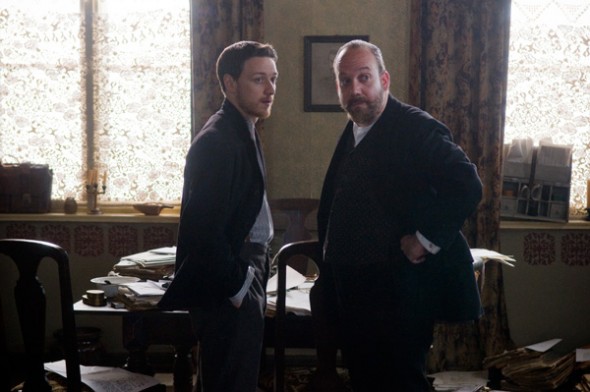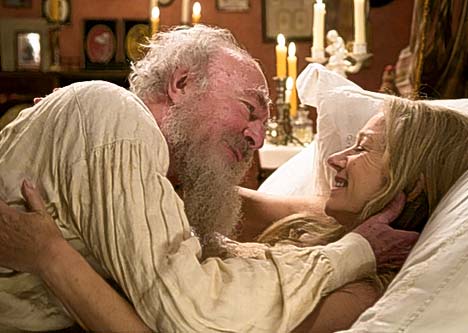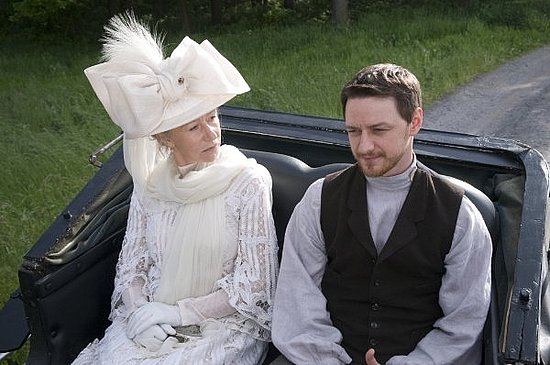The Last Station, directed by Michael Hoffman (Game 6), revolves Russian author Leo Tolstoy and his work. The man was certainly a legend; considered one of the greatest authors of all time, his novels War and Peace and Anna Karenina are absolute masterpieces.
Rather than form a biopic around the author’s whole life (which would most likely not be possible in only 2 hours), it instead focuses on the later years of his life; more specifically on his troubled marriage and the conflicts he came across as he neared the end of his life. While the premise sounds boring enough to put any teenager to sleep, the film was generally well-received and the performances were all critically-acclaimed. Now that the film is on Blu Ray we get a chance to travel back to Russia, circa 1910 and reflect on a great artist’s life.
The film centers around two major conflicts: Tolstoy (Christopher Plummer) and his disgruntled wife Sofya’s (Helen Mirren) strained relationship and the cause of said strain – a decision Tolstoy must make. Vladamir Cherthov (Paul Giamatti), a fanatic of Tolstoy’s teachings, is determined to push the Tolstoyan Movement (which preached for a shared community a la socialism, celibacy, etc.). In order to perserve the life of the movement, he must get Tolstoy to change his will to make all of his work public domain. Of course, Sofya doesn’t want this and would rather have her husband keep the copyright to his family.
Enter Valentin Bulgakov (James McAvoy), a loyal follower of the movement who is hired by Cherthov to serve in the Tosltoy home and act as a spy. Cherthov wants Valentin to record everything that goes on in the house, especially Sofya’s behavior, so he can use it against her to prove to Tolstoy that he should amend his will.
While the conflicts presented here are all well and good, the film doesn’t go any deeper into Tolstoy’s life. Instead, we only get recounts from characters speaking of the author’s past accomplishments. By doing so, they take this legendary figure and reduce him to nothing but an ordinary man. Anyone unfamiliar with Tolstoy will fail to see the genius that he was and why he was so highly regarded. The film never knows what it wants Tolstoy to be: a genius, a loony, a saint, a phony, etc. This is largely due to Hoffman’s unsure directing.
The film contrasts the two main relationships nicely. One is fading, Tolstoy and Sofya, while one is blooming between Valentin and Masha (Kerry Condon), a fellow beautiful Tolstoyan residing at the residence. While the contrast is appreciated, the romantic subplot between Valentin and Masha feels much like the romantic subplot in The Wolfman. It’s a useless diversion from the main story, a subplot without much weight. The film’s focal point was clearly on the relationship between Tolstoy and Sofya, so why take away from that with a far less engaging romance?
Production values are high as cinematographer Sebastian Edschmid’s cinematography shows off the locations and landscapes splendidly. The set pieces and costumes are all done well and they bring the time period to life, and vividly.
More than anything, this film is an actor’s showcase. McAvoy, Mirren, Giamatti, and Plummer give four of the best performances of last year. Mirren outdoes herself, beautifully emitting the soul of a wife, heartbroken by a man whom she deeply loves. Her range of emotion is spectacular as she symphonically portrays the full range of human emotion.
Plummer, one of the most underrated actors working today, gives a performance equal to that of Mirren’s in every way. With ferocity and immense physicality, he portrays the great author so perfectly. His performance complements Mirren’s and the scenes where they argue and fight are astonishing showcases of two fantastic actors giving it their all.
Giamatti and McAvoy, while neither are as strong as Mirren and Plummer, offer solid performances. McAvoy’s role is reminiscent of his role in The Last King of Scotland. The young actor is able to hold his ground in every scene with Mirren and Plummer, delivering his best performances thus far. Giamatti, unfortunately, is subjected to the most nuanced performance of the film. Despite this, he still manages to do an admirable job at portraying a villain who truly believes what he’s doing is right. He delivers all his lines strongly and passion is emitted behind all of them.
One of the film’s faults is that it depends on how much one knows about Tolstoy. Add in the fact that this is very much a period piece and does move somewhat slow at times, it may struggle to hold your attention.
Not being a fan of period pieces and not knowing much about Tolstoy, I found myself struggling to keep up with the film. While I appreciated the high quality acting and the nice production values, the subject matter, somewhat flimsy script and general disservice to Tolstoy’s legend got to me.
The character of Tolstoy is not only unfairly portrayed, but underwritten. And he’s not the only one. Some of the other characters in the film, including Giamatti’s character, are too flat to really invest in. Throw in the rather anti-climatic ending and you’ve got a flawed film.
As good as the cast is, acting alone doesn’t make a good movie. While The Last Station isn’t a bad film, it’s not a great film either.
When it comes to the disc, the richness of the film transfers over alright, but this is definitely not one of the better pictures I have seen. There isn’t any artifacting, edge enhancement or any other problematic digital anomalies which is a good thing and it does carry a clean look. While it does have some suppressed detail and noticeable softness, it never becomes that big of an issue. A couple of scenes struggle with black levels, never as deep as they should be. The contrast in the film is fairly good and the natural light in the film works in showing off Tolstoy’s home grounds.
The audio doesn’t provide anything that stands out as this is mainly a dialogue track. The transfer handles the dialogue well, always crisp and clear and never dominated by effects or music. The atmospherics provide a passable ambience and the score sounds pretty good. The track is overall fairly subtle with the occasional surround sounds coming in during the outdoor scenes with birds chirping and whatnot. While the track does its job well enough, it really doesn’t provide anything great and rarely sounds better than a solid DVD.
The special features here are easily the weakest part of the disc. We get the following:
* Commentary with Christopher Plummer and Helen Mirren
* Commentary with Director Michael Hoffman
* The Missed Station Outtakes
* Deleted Scenes
* A Tribute to Christopher Plummer
* movieIQ+sync and BD-Live connect you to real-time information on the cast, music, trivia and more while watching the movie! (Blu-ray only)
There really isn’t anything notable found here. The tribute to Christopher Plummer is the tribute they had at the AFI Fest in 2009. It wasn’t terribly interesting there and it’s not here. The deleted scenes and outtakes are the same cut-and-dry affair we’ve seen on every other Blu Ray. The commentaries I’d only recommend if you were really a fan of the film. The one with Mirren and Plummer is the one I found to be the better of the two, but unless you really enjoy the film I’d say just skip over them.
At the end of the day, The Last Station is a film that is mediocre. While I’m glad I saw it once, I don’t see myself watching it again. The performances are great, there’s no denying that, but aside from the acting, it doesn’t bring a whole lot to the table.
Bottom Line: As I said before, your enjoyment of the film will depend heavily on your knowledge of Tolstoy and if you enjoy period pieces. Keep this in mind when considering the Blu-Ray. If you know nothing of Tolstoy and have a low tolerance for period pieces, you may find yourself disappointed with the film. You can give it a rent just to see the performances, but the film doesn’t offer much else after that.
Movie – 6.5 out of 10
Video – 7 out of 10
Audio – 7.5 out of 10
Extras – 4 out of 10


